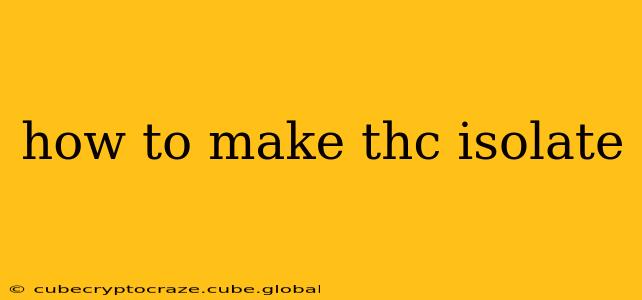How to Make THC Isolate: A Comprehensive Guide (for informational purposes only)
Disclaimer: The information provided in this article is for informational purposes only and should not be interpreted as a guide to illicit activities. The production and possession of THC isolate are illegal in many jurisdictions. This article does not endorse or encourage any illegal activity. Always comply with local and national laws regarding cannabis.
THC isolate, a pure form of tetrahydrocannabinol (THC), is a highly concentrated cannabis extract. Its production is a complex process requiring specialized equipment and expertise, and is generally not something that can be safely replicated at home. However, understanding the general process is important for context. This guide outlines the general steps involved, but again, it is crucial to emphasize that attempting this process without the proper knowledge, equipment, and legal permissions is extremely dangerous and illegal.
What is THC Isolate?
THC isolate is 99%+ pure THC, devoid of other cannabinoids, terpenes, and plant matter found in cannabis. This results in a potent product with a noticeably different effect compared to whole-plant cannabis. The lack of terpenes means it lacks the characteristic aroma and flavor profile of cannabis strains.
The General Steps Involved in THC Isolate Production (For Informational Purposes Only)
The process of creating THC isolate involves several steps, each requiring specialized knowledge and equipment:
1. Extraction: This is the crucial first step, typically involving supercritical CO2 extraction or hydrocarbon extraction. Both methods require specialized equipment capable of handling high pressures and temperatures. These methods extract the cannabinoids and terpenes from the cannabis plant material.
2. Winterization: This process removes unwanted lipids and waxes from the extract, improving its purity and clarity. This involves chilling the extract and filtering out the undesirable components.
3. Filtration: Further purification is achieved through filtration, removing remaining impurities and unwanted plant material. Multiple filtration steps might be employed.
4. Distillation: This is arguably the most critical step, separating the THC from other cannabinoids and terpenes. Short-path distillation is commonly used, requiring specialized equipment operating under a vacuum at precise temperatures. This process yields a more concentrated THC fraction.
5. Crystallization: The final step is crystallization, where the purified THC is cooled to form its characteristic crystalline structure. The purity of the isolate is determined at this stage.
Frequently Asked Questions (FAQs)
What equipment is needed to make THC isolate? Specialized equipment is necessary, including CO2 extractors, short-path distillation systems, vacuum pumps, filtration apparatus, and temperature-controlled environments. This is expensive equipment requiring significant technical expertise to operate safely.
Is it safe to make THC isolate at home? No, attempting to produce THC isolate at home is extremely dangerous. The process involves handling volatile solvents and high pressures, posing significant risks of explosion, fire, and chemical exposure.
What are the legal implications of making THC isolate? The production and possession of THC isolate are illegal in many jurisdictions. Always comply with local and national laws.
What are the potential dangers of consuming THC isolate? Due to its high potency, THC isolate can lead to intense psychoactive effects, potentially overwhelming for inexperienced users. It's crucial to start with very small doses.
Conclusion
The production of THC isolate is a complex and potentially hazardous process requiring specialized knowledge, equipment, and a controlled environment. It is strongly discouraged to attempt this process at home due to the inherent risks and legal consequences. This information is provided solely for educational purposes and should not be interpreted as a guide for illicit activity. Always prioritize safety and adhere to all applicable laws and regulations.
